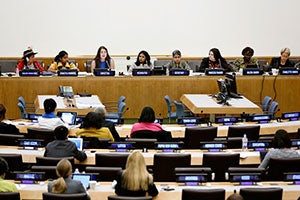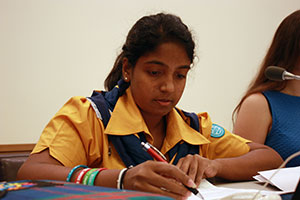“What do the MDGs mean to me?” Girls and women speak from their own experiences at the Stakeholder’s Forum
Date:
A civil society panel, organized by UN Women at the global Stakeholder’s Forum on “Challenges and Achievements in the Implementation of the Millennium Development Goals for Women and Girls: The Road Ahead,” brought together voices of women and girls from different parts of the world and across a broad age spectrum to assess the relevance of the current United Nations Millennium Development Goals (MDGs) to their lives, identify glaring gaps and present their aspirations for the future development agenda.

Through a strong narrative from a plurality of voices, the discussion highlighted common threads, such as gender-based violence, that impact women from all backgrounds. The panelists were united on the urgent need to address the missing MDG on ending violence against women and girls, and to include this crucial issue in the new development agenda.
“There is no one monolithic women’s voice. It is the plurality and richness [of women’s experiences] that must inform the MDGs,” said moderator Rangita de Silva de Alwis, Director of the Global Women's Leadership Initiative at the Wilson Centre. She added that historically, laws had been drafted “in the image of men, and it is time for women to reclaim the decision-making process.”
The panel included Christina, member of the Working Group on Girls from New York; Chamathya Fernando, member of World Association of Girl Guides and Girl Scouts from Sri Lanka; Tania Edith Pariona Tarqui, head of the Commission of Indigenous Children and Youth in the Enlace Continental de Mujeres Indígenas de las Américas (Continental Network of Indigenous Women of the Americas), from Peru; Manizha Naderi, Executive Director of Women for Afghan Women in Afghanistan; Salina Sanou, head of Policy and Advocacy at the Agency for Cooperation and Research in Development (ACORD) International, Kenya; and Charlotte Bunch, Founding Director and Senior Scholar of the Center for Women's Global Leadership at Rutgers University, USA.
From New York City, 17-year-old Christina spoke about the poverty she has witnessed and shared her experiences connecting with girls from across the world through the Working Group on Girls and hearing stories of sex trafficking and child marriages, which affected her deeply.
“I am so hurt that so many girls can’t attend any school at all. I especially remember the day the news about Malala Yusufzai broke. I remember the shock and outrage I felt. The two of us have experienced extremely different lives. But we are united by girlhood and the common struggle of girls everywhere, no matter where we live.”
From Kenya, Ms. Sanou narrated a story about how women and girls have little knowledge about the MDGs and how in Nigeria, some thought that the MDGs were a brand of biscuits or soda. She also provided insight into other gaps in the MDGs based on her experience as an education and gender specialist for the MDG centre in Nairobi. The current MDGs are ill-equipped, she reiterated, for dealing with fragile, conflict-ridden states. But the most obvious gap is the omission of a goal to prevent and end violence against women. She also stressed the importance of women’s political leadership and including them at the decision-making table to ensure future goals are more relevant to their lives.

From Sri Lanka, 20-year-old Ms. Fernando highlighted the important role men can play in addressing and combating violence against women and also called for specific attention to marginalized groups in post-conflict settings.
Horrific incidents of violence against women and girls were shared by Ms. Naderi, who started her NGO for survivors of violence after a visit to an Afghan jail where she met girls as young as 17, many of them having run away from forced marriages, rape and domestic abuse. Identifying violence against women as the “biggest problem” in Afghanistan, and with 90 per cent of all households having experienced some form of violence, she said it was a “glaring omission” to not include its prevention in the current development goals.
Ms. Bunch said the MDGs have excluded groups of women because of what she characterized as a deliberate refusal to include the ‘alternative family’ perspective and the issue of sexual rights. Wrapping up the session, she reflected on the salience of the international women’s rights movement and said the Beijing+20 anniversary and the post-2015 era present a golden opportunity to mobilize governments into taking concrete action to decrease violence against women and other pressing issues.
“What we have learned in these 20 years is that every single issue --poverty, violence, discrimination-- affects each other. As we work towards a stand-alone goal for gender equality as well as the integration of gender equality in all development goals, the key challenge is to keep in mind that if we do not advance in one area, we will see limitations in the advancement of the other.